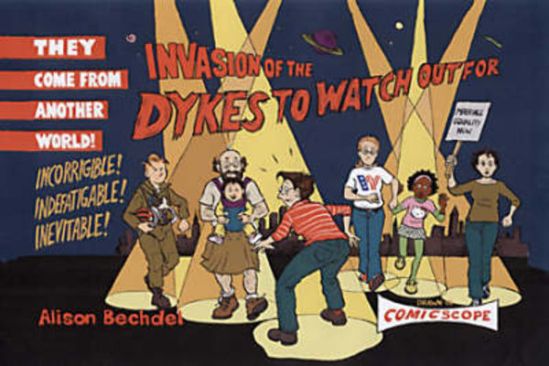
Here is the abstract for Lukas Etter’s talk at the Illustration, Comics, and Animation Conference at Dartmouth College (April 19 – 21, 2013):
Seria(s)lly episodic. Gradual Formal Variations in Alison Bechdel’s Feminist Comic Strip Dykes to Watch Out For (1983-2008).
Lukas Etter
When early in 2000 comic artist Alison Bechdel depicted herself as insane, this was due to the political state of her country. The episode in question, titled “Leadership Vacuum”, is a one-page comic strip in which the artist is shown at the drawing board, incapable of bearing the ‘loudness’ of the current political discourse resulting from the Lewinsky affair of the previous year. Simultaneously depicted is a main character, Mo, who transgresses from an intra- into an extradiegetic world by ‘stepping out’ of the strip and addressing the readers in order to explain the author’s alleged insanity. “Leadership Vacuum” is an episode of Dykes to Watch Out For, a bi-weekly feminist comic strip syndicated in U.S.-American periodicals between 1983 and 2008 – i.e., the strip which Bechdel had been working on for more than 17 years at this point.
These 17 years are subtly reflected in the episode “Leadership Vacuum”, given that Mo rummages in drawings made at an earlier stage. While self-reflexivity is almost always present in Bechdel’s later work – Fun Home (2006), “Cartoonist’s Introduction” (2008), “Compulsory Reading” (2008), “Wrought” (2008), Are You My Mother? (2012) – the rummaging in earlier drawings, and more generally speaking such an explicit type of self-reflexivity, is exceptional for a Dykes to Watch Out For episode. More importantly still, it is a subject matter largely understudied in critical literature on Bechdel’s work. Here begins, ultimately, what the present paper aims to focus on: The gradual formal changes over time in Dykes to Watch Out For, with a special interest in drawing style as well as narrative features – such as direct addressing of the readers at the end of an episode (“Stay tuned!”). An analysis of such changes will facilitate our understanding of the mechanisms at work a flexinarrative (i.e. combination of the ‘episodic’ and the ‘serial’ proper) on a more abstract level. It will add to an understanding of how Bechdel’s strip continually serves as a pungently sarcastic comment on contemporary ‘Western’ society at large for – in Eco’s terms – both a ‘naïve’ reader and a ‘smart’ one.